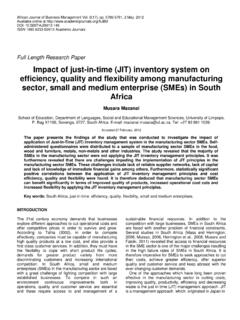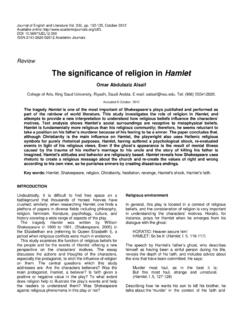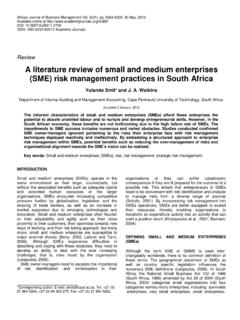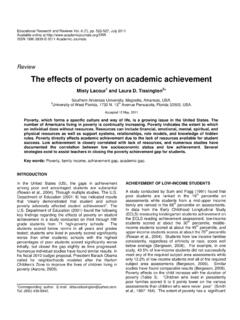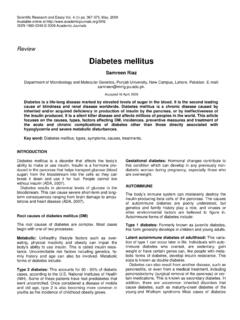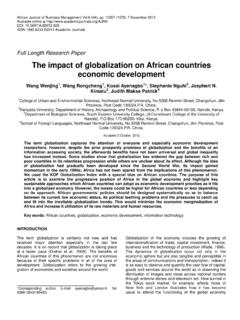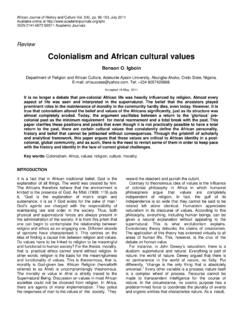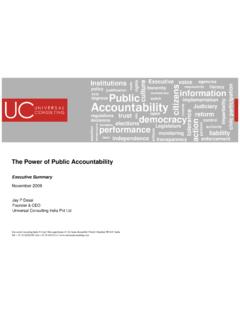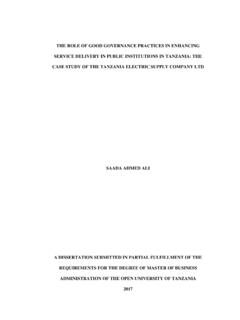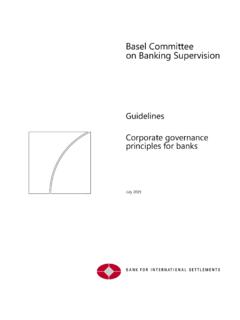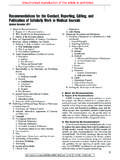Transcription of New Public Management (NPM): A dominating paradigm in ...
1 Vol. 9(4), pp. 141-151, April 2015 DOI: Article Number: 4F1085051982 ISSN 1996-0832 Copyright 2015 Author(s) retain the copyright of this article African Journal of Political Science and International Relations Full Length Research Paper New Public Management (NPM): A dominating paradigm in Public sectors Fakhrul Islam Department of Public Administration, Shahjalal University of Science and Technology Sylhet-3114, Bangladesh. Received 5 February, 2015; Accepted 28 March, 2015 New Public Management (NPM) system hasbeen the dominant paradigm i n Public administration theory and practice since 1980s, having its affinity with markets and private sector Management as the old administrative model has been under severe criticisms for its inability to deliver goods and services to the people.
2 NPM is depicted as a normative conceptualization totally different in many ways from traditional Public administration, providing services that citizens value to increase the autonomy of Public managers and rewarding organizations and individuals to enhance the efficiency of Public sector production. This paper focuses on the introductory discussion of the NPM system which has replaced the traditional Public administration system and analysis of the trends, rationales and scope of reforms of the Public sector in Bangladesh and African countries.
3 The paper is based on archival research, where secondary data sources have been used and methodological filter was applied to confine the literature. New Public Management (NPM) is a different paradigm of Public Management that puts forward a different relationship between governments, the Public service and the Public . Key words: New Public Management , traditional administration, Public service, efficiency. INTRODUCTION The modern administrative system came into existence in the 19th century. Until the 1960s, the interventionist character of the government was quite evident in pro-duction, provision and regulatory activities.
4 The features of this interventionist state were clearly set out by Max Weber with strong echoes from other scholars. Policy-administration dichotomy, rule-based administration, meritocracy, career system, impersonality, division of labor and hierarchy are the essential characteristics of the system (Peters, 1996). Caiden argued, All blamed the dead hand of bureaucracy, especially the poor performance of Public bureaucracies and the daily annoyances of irksome restrictions, cumbrous red-tape, unpleasant officials, poor service and corrupt practices (Hughes, 2003:02).
5 The old administrative model has been under severe criticisms for its inability to deliver goods and services to the people. The new approach, namely New Public Management (NPM) emerged to E-mail: Tel: 01710186064. Authors agree that this article remain permanently open access under the terms of the Creative Commons Attribution License International License 142 Afr. J. Pol. Sci. Int. Relat. replace the traditional model of Public Management during the 1980s and 1990s in response to the inadequacies of the traditional model (Hughes, 2003).
6 One of the most influential factors leading to the emergence of NPM has been the historical shift in state ideology since in the late 1970s in advanced capitalist nations towards a neo-liberal formwork, which rejects the welfare state, opposes a large Public sector, doubts government capacity, blames Public bureaucracy, believes in the private sector superiority and emphasizes market competition in service delivery (Haque, 2003). New Public Administration reforms, it is said, are a common response to common pressures- Public hostility to government, shrinking budgets and the imperatives of globalization (Charles, 1999: 1).
7 New Public Manage-ment is a vision, an ideology or a bundle of particular Management approaches and techniques (Kalimullah et al., 2012). The Public Management paradigm has the very different underlying theoretical basis of economics and private Management (Hughes, 2 0 03) which promises a leaner and better government, decentralization, empowerment, customer satisfaction and better mechanisms of Public accountability . The new approach has brought a radical change in organizational culture, but not without cost.
8 It is the development or application of methodological and systematic techniques, often employing measurement and comparison that are designed to analyze and make the operation of Public organizations more efficient and effective. Reforms aimed at improving the quality of Public services (Balk, 1996), saving Public expenditure, increasing the efficiency of governmental operations and making policy implementation more effective (Flynn, 1993a; Frederic, 1998a). This approach has problems, not the least of them the disruption to standard operating procedures and poor morale and involves a paradox of centralization through decentralization.
9 To illustrate the point, Kaboolian (1998), Khademian (1998) and Maor (1999) pointed out that giving Public managers more authority to manage programs may result in concentrating decisions making in them. Thus, NPM may lead to centralized decision making by Public managers, rather than encouraging decentralization in Public organizations as it claims. Besides, NPM concerns applying private sector Management techniques to the Public sector, but the areas of Public service and administration are distinct from the private sector.
10 However, the new Public administration postulates that Public officials should drop the fa ade of neutrality and use their discretion in administering social and other programs. Moreover, it recommends client-focus administration along with debureaucratization, democratic decision making and decentralization of administrative processes in the interest of more effective and humanistic delivery of Public services (Hughes, 2003:15). Many governments and several international organizations have embraced the NPM as the framework or paradigm through which governments are modernized and the Public sector re-engineered to strengthen the connections between government and the mechanisms, both in government and civil society, that are responsible for how well government works for Public service (Armacost, 2000,).

